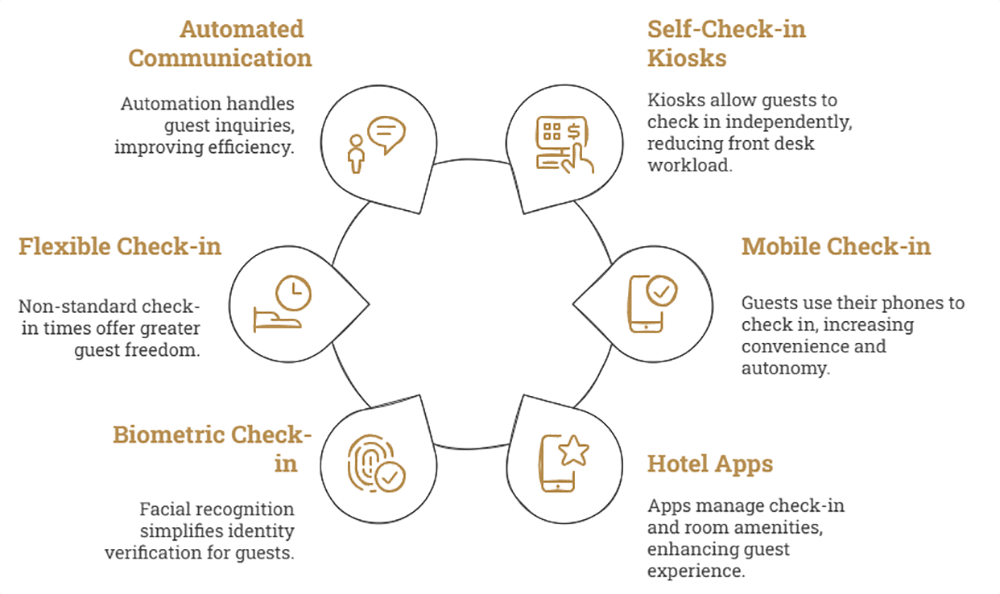Hotel check-in timing refers to when guests can check into a room or check out after their stay. It’s often best to consider it as a window where staff and guests can align their needs. The timing is important to guests because it can limit or control their schedule. At the same time, it’s important to hoteliers as it allows for housekeeping, guest satisfaction, and overall management of a property. In this article, you’ll learn about the various hidden depths of check-in times. This includes getting the most from it.
Table of Contents:
- What is Hotel Check-in?
- What Time is Check-In at Hotels?
- Issues to Consider When Setting Your Hotel Check-in Time
- New Trends in Hotel Check-in Processes
- Self-Check-in Kiosks Make Flexibility Easier
- Mobile Check-in Makes It as Simple as Using a Phone
- Apps Ensure the Hotel Works for the Guest
- Biometric Check-in Is Where Everyone Knows Your Face
- Flexible Check-in Allows for Greater Autonomy
- Automated Communication Further Automates the Check-in Process
- Check-in Desks Will Always Be Important
- What Are the Processes Involved in Hotel Check-In?
- Foundational Elements of Hotel Check-in Timing
- Hotel Check-in Timing for Guests Running Early or Late
What is Hotel Check-in?
On a basic level, the check-in is simply the practical setup for a guest’s stay. The check-in process involves checking the hotel guest’s information in the system and providing them with access cards or keys. However, one of the reasons why hotel check-in timing is so important is that check-in goes beyond utilitarianism.
The check-in process is where guests get their first impression of their upcoming experience. The importance of this first impression is the same as if meeting someone for the first time. The front desk ensures new guests feel properly welcomed.
What Time is Check-In at Hotels?
Hotel check-in timing typically functions as a window of availability between 2 and 4 PM. It’s important because it allows hoteliers and guests to set expectations for service in order to ensure a smooth experience. A two-hour window can be rather limiting, especially for international travelers. Likewise, guests might feel rushed when trying to arrive or depart at specific times.
Hoteliers have a number of options to get around those issues. A 24-hour reception is one possibility, though this comes with an obvious additional cost for staff to manage it. Likewise, having timing spread out can pose additional challenges to housekeeping. Self-check-in kiosks, in particular, are a rising trend in the hotel industry. The kiosks can run all day and at little extra cost. The main challenge comes from balancing customer satisfaction with their own autonomy and the significant pleasantries of human interaction.
Issues to Consider When Setting Your Hotel Check-in Time
Hotel check-in timing typically involves interaction between the guest and staff at the front desk. However, there are more details to keep in mind that are going to make or break the guest’s overall experience. Housekeeping is arguably the most significant of these hidden connections to hotel operations.
Housekeeping can function best when the department can predict when guests will arrive or depart. It’s much easier to do so with a set window for the hotel check-in time. Check-out time can pose extra challenges as external factors can result in mass exodus. For example, if a convention finishes early then many guests will check out early. These challenges can be mitigated to an extent by keeping some rooms available for early check-ins. The cost can be somewhat balanced with early check-in fees.
New Trends in Hotel Check-in Processes
Balancing the needs of staff, guests, and the property as a whole involves carefully managing a lot of moving pieces. However, the following new technologies can vastly streamline the check-in process.
Accomodation Knowledge – Handling Guest Check in
Self-Check-in Kiosks Make Flexibility Easier
The self-check-in kiosk is a piece of technology that lets guests check in on their own. It’s typically in the form of a touch screen. It’s an important tool for hotel check-in timing because it removes repetition from the front desk. Kiosks also streamline the process of guest data collection. For example, the front guest will typically ask for information like the guest’s address, phone number, and credit card information. A kiosk can handle that while also using cloud technologies to stay PCI DSS compliant. Automation also helps ensure compliance with payment security.
Mobile Check-in Makes It as Simple as Using a Phone
Mobile check-in is a convergence of the social trend of smartphone usage with hotel trends. It’s a concept that enables check-in through the guest’s phone. Mobile phones are important for hotel check-in timing because they automate and streamline elements of the process. This increases guest autonomy while staff can refocus efforts elsewhere. Another significant gain from leaning on smartphones is that it allows younger guests to work with the tools they know. Generations who’ve grown up with smartphones are used to using them for payment, scheduling, entertainment, business, and more.
Apps Ensure the Hotel Works for the Guest
Apps are another element of smartphone check-in, but they’re still distinct. App-based solutions are tightly integrated, often to the point of offering offline check-in functionality. Apps are especially important because they extend past check-in and into the larger hotel business. For example, an app could manage check-in and room amenities. Imagine guests using an app for check-in, opening their room, turning on the TV, and setting the climate control to suit their own preferences. However, there are some issues. For example, guests need to download and install the phone app.
Biometric Check-in Is Where Everyone Knows Your Face
Biometrics is a large category that refers to technologies that can read data from your body. In this case, recognizing you by your facial features. Much of the check-in process is just focused on proving your identity. Biometrics’s importance stems from it essentially allowing the hotel itself to recognize guests. Imagine how much easier it’d be for a guest to simply walk right up to a room and access it via biometrics. There’d be no need for keycards or swipes. Unlocking the door is like unlocking a phone with biometrics.
Video: Touchless Check-In at Hilton Norfolk THE MAIN
Flexible Check-in Allows for Greater Autonomy
Flexible check-in changes the hotel check-in timing methodology to meet different needs. It essentially creates non-standard check-in times as a new standard for the hotel. This is an important change as a hotel owner can advertise his property as quite distinct from the competition. This flexible option is often attractive. Some travelers like to plan things out carefully. But others want their vacation to be free of timekeeping and clocks. The flexible check-in option lets them have full autonomy during their trip. This makes for a more personalized experience and returning customers.
Automated Communication Further Automates the Check-in Process
Automated communication might sound mysterious, but you’ve probably used it before. It’s essentially any technique that lets you talk to an automated system like a chatbot. This is an important technique because it helps to essentially create a system of escalation. Automation can let humans answer a guest’s most important questions. Meanwhile, simple questions that might be answered by FAQs, documentation, or the website can be handled by automated responses. One big advantage of hotel check-in timing is that the automation can check the status in real-time. Some even use automated notifications.
Check-in Desks Will Always Be Important
Check-in desks might not seem like a new trend in the hotel industry or for hotel check-in timing. But the human element is still important. People will always need to be able to simply ask questions and get answers from a friendly representative. Happy staff acts as your hotel’s ambassadors. On top of those points, humans are always needed for those unpredictable events. A guest will often want something that’s easily solved by a person but which they can’t handle on their own. And it’s those moments that stick with the guest.
What Are the Processes Involved in Hotel Check-In?
You have a great deal of freedom in the overall design for your hotel check-in timing. However, you’ll need to consider how to implement the following vital processes into the experience.
- Verification and Reservation Confirmation: Names and identification are given by the guests to prove their identity.
- Payment and Security: A guest will usually provide a credit card number both for payment and as potential compensation for damage to the room.
- Room Assignment: The guest is assigned a room. The room class and designation are based on availability, reservation type, and the guest’s stated preferences.
- Key Card Issuance: The means of entry are given to the guest after the prior confirmations. This will typically be a keycard or a physical key.
- Information Sharing: This is where the human element comes into play. The front desk will provide guests with everything they need to know about the hotel. But they’ll also be able to fill the hotel guests in with information about attractions like restaurants or fun activities to enrich their stay.
Foundational Elements of Hotel Check-in Timing
Hotel check-in timing brings both benefits and challenges. Understanding the benefits and the hotel technology that can be implemented will open up many new paths to success. Technology and benefits for early check-in go hand-in-hand. In a sense, it makes the entire hotel work for both you and your guests. For example, consider the relief of someone who arrives in the early morning but can check-in.
In the article “Early Check-in Hotels: Optimize the Guest Experience & Hotel Revenue” you’ll find everything from why early check-ins are beneficial to technologies that facilitate them.
Hotel Check-in Timing for Guests Running Early or Late
The flip side of early hotel check-in timing is late check-ins. The two have a lot in common. In particular, they provide ease of mind and comfort to potentially stressed guests. Hotel management implementing one can typically add the other, too. However, there are some unique late-night elements to consider. For example, there might be potential security concerns that come from late-night activity.
You can learn more about the guidelines used to create a late check-in policy in the article “Late Check-In Hotel Guide: Key Strategies for Hoteliers”.
Did You Like This Article about Hotel Check-in Timing?
You might also be interested in the following articles:
- Hotels with Late Check-Out: Why Improve Guest Satisfaction
- Mobile Check-In App for Hotels: What Are The Benefits?
- Hotel Concierge: Learn About Guest Services Representatives of a Hotel
- Greeting and Welcoming Guests: How to Make a Great First Impression
- Hotel Welcome Message for Guests: How to Write + 5 Free Examples
Hotel check-in timing poses significant challenges. But you now have the tools needed to reap the equally significant benefits. It’s simply down to applying what you’ve learned.
More Tips to Grow Your Business
Revfine.com is the leading knowledge platform for the hospitality and travel industry. Professionals use our insights, strategies, and actionable tips to get inspired, optimize revenue, innovate processes, and improve customer experience.Explore expert advice on management, marketing, revenue management, operations, software, and technology in our dedicated Hotel, Hospitality, and Travel & Tourism categories.
This article is written by:
Hi, I am Martijn Barten, founder of Revfine.com. With 20 years of experience in the hospitality industry, I specialize in optimizing revenue by combining revenue management with marketing strategies. I have successfully developed, implemented, and managed revenue management and marketing strategies for individual properties and multi-property portfolios.










Leave A Comment